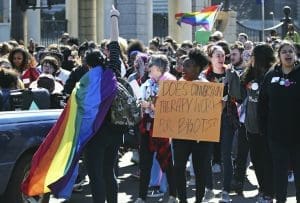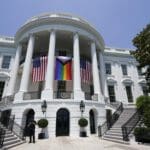US still won't ban dangerous anti-LGBTQ 'therapy' despite international pressure
The U.N. says the practice should be banned across the globe.

The United States still has not implemented a federal ban on a widely discredited “therapy” that harms LGBTQ people, one month after the United Nations called on countries to discontinue the practice.
The U.N. first released a report back on May 1 that urged nations across the globe to ban the dangerous practice known as “conversion therapy,” which is used to try to change a queer person’s sexuality or a transgender person’s gender.
The so-called “therapy” is banned in 20 states and the District of Columbia, but attempts to pass legislation banning it at the federal level have been unsuccessful.
At least 68 countries still use “conversion therapy,” according to the U.N. report. Treatment can include what is known as “corrective rape,” where people, usually women, are raped to “correct” their sexuality; forcing people to take hormone or steroid therapy; being taken to religious camps and informed that their sexuality or gender is sinful; and “aversion,” where a person undergoes negative, painful, and generally distressing sensations while exposed to a stimulus.
“At the systemic level, leaders of faith-based organizations and political authorities have endorsed the practice in countries as diverse as Colombia, Israel, the Philippines, Uganda and the United States,” the U.N. report states.
It also refers to a 2019 Williams Institute report in which researchers estimated that nearly 700,000 LGBTQ Americans between 18 and 59 years old had experienced some kind of “conversion therapy” and that 16,000 LGBTQ people between 13 and 17 will endure the practice before they turn 18 in states that do not ban it.
This is not the first time that the U.N. has condemned the “therapy.” In 2014, the U.N. Committee Against Torture pressed State Department officials on why “conversion therapy” was still allowed. At that time, 48 states were utilizing the practice against LGBTQ people.
In 2015, the U.N. High Commissioner for Human Rights released a report that said states had an obligation to protect LGBTQ people from “torture and other cruel, inhuman and degrading treatment or punishment,” which included “conversion therapy.”
President Barack Obama called for an end to these acts in 2015 after a transgender girl, Leelah Alcorn, died by suicide. In her suicide note, she wrote that she was taken to Christian therapists who told her that being transgender was wrong.
Government officials and activists from across the world have recently shown an interest in learning more about the practice and its dangers.
In March, Harvard Law School hosted international medical experts, government officials, and human rights activists to talk about the harm of “conversion therapy.” Randy Boissonnault, former MP and adviser on LGBTQ issues to Canadian Prime Minister Justin Trudeau, and Laurence Vanceunebrock-Mialon, a member of the French parliament, were present at the meeting, which was convened by Victor Madrigal-Borloz, a U.N. independent expert on violence against LGBTQ people.
U.S. lawmakers, meanwhile, have tried to introduce federal legislation banning the “therapy,” to no avail.
Rep. Ted Lieu (D-CA) introduced legislation to ban the practice in 2015, 2017, and 2019, but none of those attempts ever advanced to a vote, despite having hundreds of co-sponsors, none of whom were Republican.
At the state level, some officials have implemented bans with penalties allowing licensing boards to discipline any mental health professional uses the practice, including by suspending their license. However most of those bans do not apply to religious providers, according to the Movement Advancement Project, which tracks anti-“conversion therapy” laws.
As global officials urge countries to disband the practice, some in the United States are doing the opposite.
Last week, the Republican National Committee voted to leave its official party platform unchanged from 2016. The 2016 platform includes a number of transphobic and homophobic statements, including language that appears to support “conversion therapy.”
Though the dangerous practice is not mentioned by name, the platform states that the party supports parents’ complete control over their children’s healthcare, which no exceptions, noting that they should be able to “determine the proper medical treatment and therapy for their minor children.”
As the U.N. noted in its report last month, LGBTQ young people are often forced into “conversion therapy” because they don’t have the legal protections to ensure they receive the health care they want. Total family control over these decisions can subject them to medically discredited practices that have been associated with poor mental health outcomes, such as an increased likelihood of attempted suicide.
Published with permission of The American Independent Foundation.
Recommended

Alaska House committee advances, expands proposal to bar trans girls from girls sports
Amended bill would add elementary, middle school and collegiate sports to limits in place for high school
By Claire Stremple, Alaska Beacon - April 16, 2024
Bills targeting trans people are on the rise nationwide and in Alaska — most focus on children
House committee advances legislation that would restrict the rights of Alaska trans kids
By Claire Stremple, Alaska Beacon - April 01, 2024
Anti-abortion, anti-LGBTQ resolutions to be voted on at state Republican convention
A resolution to be considered by North Dakota Republican Party delegates at their upcoming convention would define life as beginning at fertilization and call for criminal penalties for “anyone who kills a pre-born human being.”
By Michael Achterling, North Dakota Monitor - March 26, 2024









































































